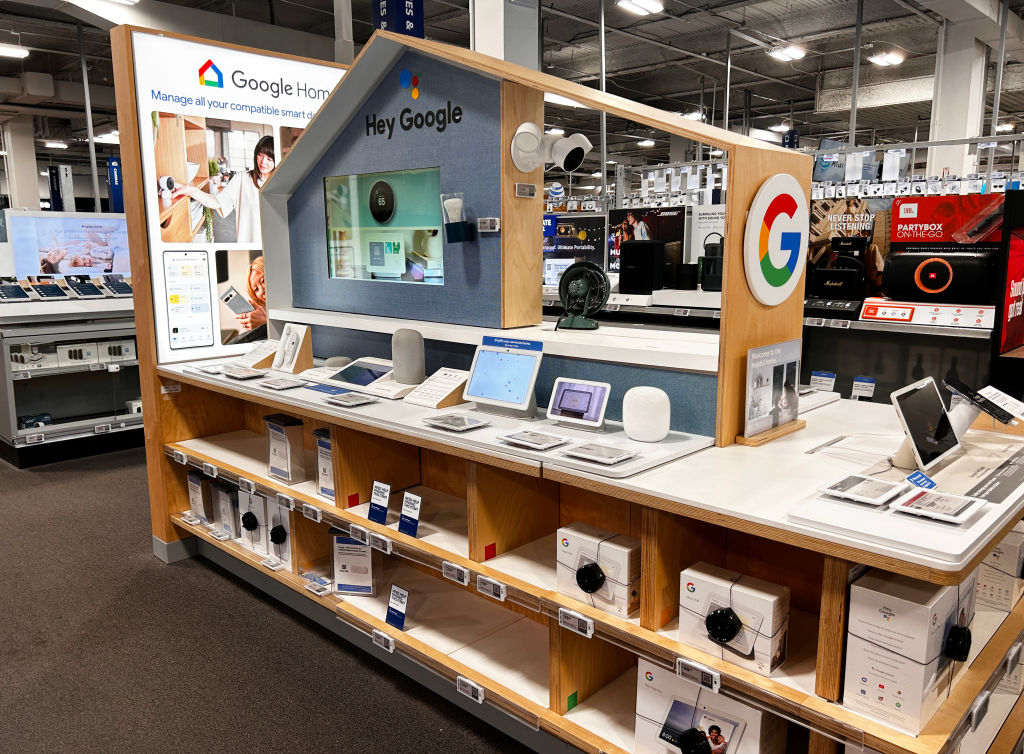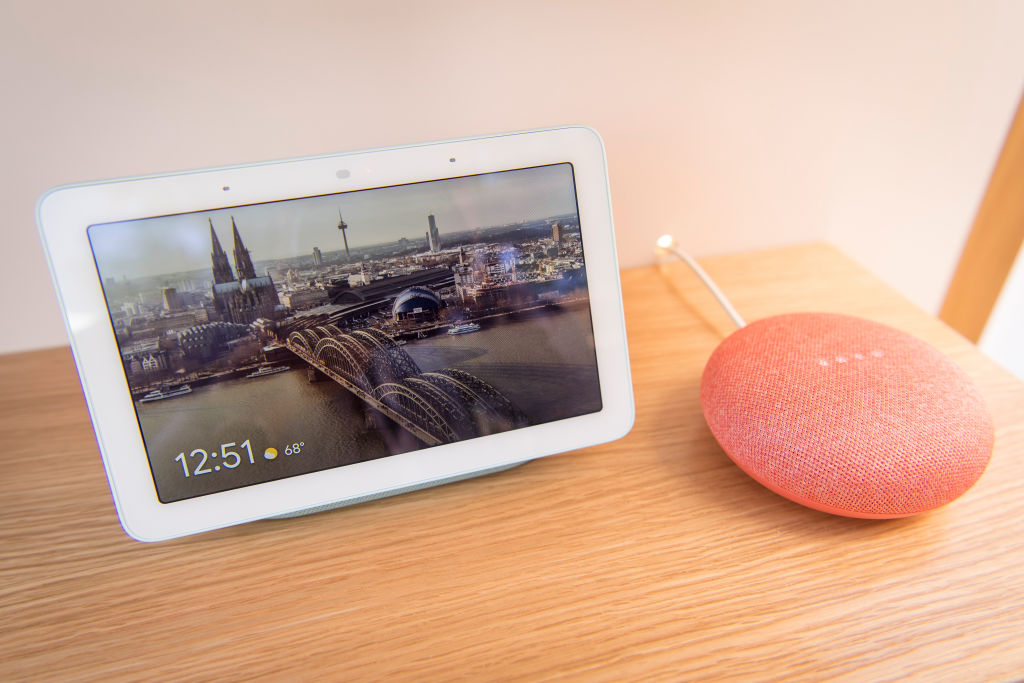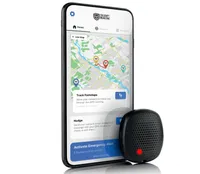Google Smart Home Devices Are Glitching and Users Are Frustrated
From missed alarms to unresponsive commands, Google’s smart home tech is leaving users in the lurch.


Profit and prosper with the best of Kiplinger's advice on investing, taxes, retirement, personal finance and much more. Delivered daily. Enter your email in the box and click Sign Me Up.
You are now subscribed
Your newsletter sign-up was successful
Want to add more newsletters?

Delivered daily
Kiplinger Today
Profit and prosper with the best of Kiplinger's advice on investing, taxes, retirement, personal finance and much more delivered daily. Smart money moves start here.

Sent five days a week
Kiplinger A Step Ahead
Get practical help to make better financial decisions in your everyday life, from spending to savings on top deals.

Delivered daily
Kiplinger Closing Bell
Get today's biggest financial and investing headlines delivered to your inbox every day the U.S. stock market is open.

Sent twice a week
Kiplinger Adviser Intel
Financial pros across the country share best practices and fresh tactics to preserve and grow your wealth.

Delivered weekly
Kiplinger Tax Tips
Trim your federal and state tax bills with practical tax-planning and tax-cutting strategies.

Sent twice a week
Kiplinger Retirement Tips
Your twice-a-week guide to planning and enjoying a financially secure and richly rewarding retirement

Sent bimonthly.
Kiplinger Adviser Angle
Insights for advisers, wealth managers and other financial professionals.

Sent twice a week
Kiplinger Investing Weekly
Your twice-a-week roundup of promising stocks, funds, companies and industries you should consider, ones you should avoid, and why.

Sent weekly for six weeks
Kiplinger Invest for Retirement
Your step-by-step six-part series on how to invest for retirement, from devising a successful strategy to exactly which investments to choose.
If you use Google smart home devices, like security cameras, speakers or doorbells, you may have noticed more glitches and technical hiccups lately. From delayed responses to outright device failures, users across the country are reporting a growing list of frustrating issues.
These problems aren't isolated. A surge of complaints has surfaced online, prompting a wave of discussion among Google Nest users. Many describe devices that are no longer responding to voice commands, randomly turning on or off or simply failing to perform basic tasks.
The situation has become widespread enough that Google publicly acknowledged the issue and promised a fix. For now, users are left waiting, navigating workarounds while hoping the tech giant delivers on its promise to restore stability.
From just $107.88 $24.99 for Kiplinger Personal Finance
Become a smarter, better informed investor. Subscribe from just $107.88 $24.99, plus get up to 4 Special Issues

Sign up for Kiplinger’s Free Newsletters
Profit and prosper with the best of expert advice on investing, taxes, retirement, personal finance and more - straight to your e-mail.
Profit and prosper with the best of expert advice - straight to your e-mail.
Users report widespread problems with Google Nest devices
In a recent Reddit thread, Google smart home device users report numerous similar issues with Google Nest devices. Google Nest encompasses a wide range of smart home products, including those previously marketed under the Google Home branding.
Google Nest devices include security cameras, speakers, doorbells, thermostats, doorbells, routers and smart speakers. Those products can interact with each other and with Google Assistant, creating a smart home ecosystem that you can control with your voice.
At least, supposedly. Commenters on the Reddit thread describe devices that appear to be degrading and losing voice control functionality as they age. Users report issues where devices can no longer understand their commands or don’t respond to them at all.
In some cases, when asked to turn off the lights, the devices turn on a fan. Alarms continue sounding in other rooms after users have turned them off. Audio devices and smart speakers unexplainably stop playing, and TVs turn off mid-use.
The issues have gotten so bad that several users report turning off and disconnecting their devices entirely.
Why Google’s smart home glitches go beyond inconvenience
The issues many users are encountering with their Google devices are inconvenient and frustrating. But for some users, who rely on Google devices for their health and safety, the malfunctioning devices pose a real risk.
For example, some individuals set Google's alarm function to remind them to take medication on time. A missed reminder could mean a missed dose of medication, negatively impacting their health.
Others may use a Google smart speaker as a backup safety device to call if a fall occurs. Since smart speakers can be operated by voice, an individual who has fallen could potentially use the speaker to call an existing contact for help.
This Bluetooth-enabled personal safety device lets you call for help with the push of a button. Whether you’re at home or on the go, it connects directly to your phone to alert contacts in an emergency.
Google responds to growing user complaints
The discussion around Google smart home device issues caught the attention of the tech giant, and Anis Kattukaran, Chief Product Officer for Google Home and Google Nest, addressed the concerns via two posts on X.
"Hey everyone, I want to acknowledge the recent feedback about Google Assistant reliability on our home devices. I sincerely apologize for what you’re experiencing and feeling!" wrote Kattukaran on the first post.
He followed up with a second post, writing, "We hear you loud and clear and are committed to getting this right – and making sure we have a long term solution that provides better reliability and capability. We have been actively working on major improvements for sometime and will have more to share in the fall."
The fact that Google acknowledged the issues and is working on a solution is good news for Google Nest users.
Tips for using Google smart home devices until a fix arrives

If you're having trouble with your Google Nest and Google Home devices, you can try troubleshooting the devices by restarting them, making sure they're connected to WiFi and confirming that you've installed all available software updates.
Since Google devices are having issues, though, basic troubleshooting may only get you so far. The Google Nest Help page offers some additional tips, and there's also an option to contact Google at the bottom of the page if you need more help.
If you can't get your devices working and you rely on them for safety, consider buying alternative devices to use until Google releases more information and a fix.
For example, if you use your Google Nest devices as a medication alarm, set medication reminder alarms on your smartphone, or you can buy a designated medication reminder alarm.
If you're worried about being able to get help after a fall, there are many medical alert devices that can call your contacts or emergency responders if you can't respond or make the call yourself. When shopping for medical alert devices, consider the type of device that's best for your needs, whether that's a pendant you can wear around your neck, a device that clips onto your belt or a wristwatch.
Be sure to carefully review all of the associated costs, too; many devices require a subscription to receive the monitoring services that would call 911 for you in an emergency, but some devices don't require a subscription. Make sure that the device you choose will work with your home WiFi or your cell service provider.
The fact that Google is working on a fix is encouraging, and hopefully they quickly identify a way to restore functionality to all of their devices. Until then, users may have to find ways to get by without the full functionality of their smart home devices.
Looking ahead for Google Nest users
It's a good sign that Google has acknowledged the issues and is working on a solution. Still, if your devices play an important role in your daily routine or safety, it’s worth exploring temporary alternatives.
Backup alarms, manual routines or even switching to another smart device brand can help bridge the gap until Google rolls out its improvements later this year.
Related Content
Profit and prosper with the best of Kiplinger's advice on investing, taxes, retirement, personal finance and much more. Delivered daily. Enter your email in the box and click Sign Me Up.

Paige Cerulli is a freelance journalist and content writer with more than 15 years of experience. She specializes in personal finance, health, and commerce content. Paige majored in English and music performance at Westfield State University and has received numerous awards for her creative nonfiction. Her work has appeared in The U.S. News & World Report, USA Today, GOBankingRates, Top Ten Reviews, TIME Stamped Shopping and more. In her spare time, Paige enjoys horseback riding, photography and playing the flute. Connect with her on LinkedIn.
-
 Quiz: Do You Know How to Avoid the "Medigap Trap?"
Quiz: Do You Know How to Avoid the "Medigap Trap?"Quiz Test your basic knowledge of the "Medigap Trap" in our quick quiz.
-
 5 Top Tax-Efficient Mutual Funds for Smarter Investing
5 Top Tax-Efficient Mutual Funds for Smarter InvestingMutual funds are many things, but "tax-friendly" usually isn't one of them. These are the exceptions.
-
 AI Sparks Existential Crisis for Software Stocks
AI Sparks Existential Crisis for Software StocksThe Kiplinger Letter Fears that SaaS subscription software could be rendered obsolete by artificial intelligence make investors jittery.
-
 One of the Most Powerful Wealth-Building Moves a Woman Can Make: A Midcareer Pivot
One of the Most Powerful Wealth-Building Moves a Woman Can Make: A Midcareer PivotIf it feels like you can't sustain what you're doing for the next 20 years, it's time for an honest look at what's draining you and what energizes you.
-
 I'm a Wealth Adviser Obsessed With Mahjong: Here Are 8 Ways It Can Teach Us How to Manage Our Money
I'm a Wealth Adviser Obsessed With Mahjong: Here Are 8 Ways It Can Teach Us How to Manage Our MoneyThis increasingly popular Chinese game can teach us not only how to help manage our money but also how important it is to connect with other people.
-
 Looking for a Financial Book That Won't Put Your Young Adult to Sleep? This One Makes 'Cents'
Looking for a Financial Book That Won't Put Your Young Adult to Sleep? This One Makes 'Cents'"Wealth Your Way" by Cosmo DeStefano offers a highly accessible guide for young adults and their parents on building wealth through simple, consistent habits.
-
 My Spouse and I Are Saving Money for a Down Payment on a House. Which Savings Account is the Best Way to Reach Our Goal?
My Spouse and I Are Saving Money for a Down Payment on a House. Which Savings Account is the Best Way to Reach Our Goal?Learn how timing matters when it comes to choosing the right account.
-
 We're 78 and Want to Use Our 2026 RMD to Treat Our Kids and Grandkids to a Vacation. How Should We Approach This?
We're 78 and Want to Use Our 2026 RMD to Treat Our Kids and Grandkids to a Vacation. How Should We Approach This?An extended family vacation can be a fun and bonding experience if planned well. Here are tips from travel experts.
-
 Why Most Millionaires Don't Feel Wealthy — and What It Really Takes to Feel Financially Secure
Why Most Millionaires Don't Feel Wealthy — and What It Really Takes to Feel Financially SecureA growing share of Americans reach millionaire status yet still worry about money. Here's why wealth feels different today and how to build true financial confidence.
-
 You Could Be Overpaying for Internet. Here’s How to Choose the Right Type
You Could Be Overpaying for Internet. Here’s How to Choose the Right TypeFiber, cable, 5G wireless and satellite internet all offer different speeds, reliability and price points. Understanding the differences could help you lower your monthly bill or improve performance.
-
 My First $1 Million: Retired From Real Estate, 75, San Francisco
My First $1 Million: Retired From Real Estate, 75, San FranciscoEver wonder how someone who's made a million dollars or more did it? Kiplinger's My First $1 Million series uncovers the answers.
